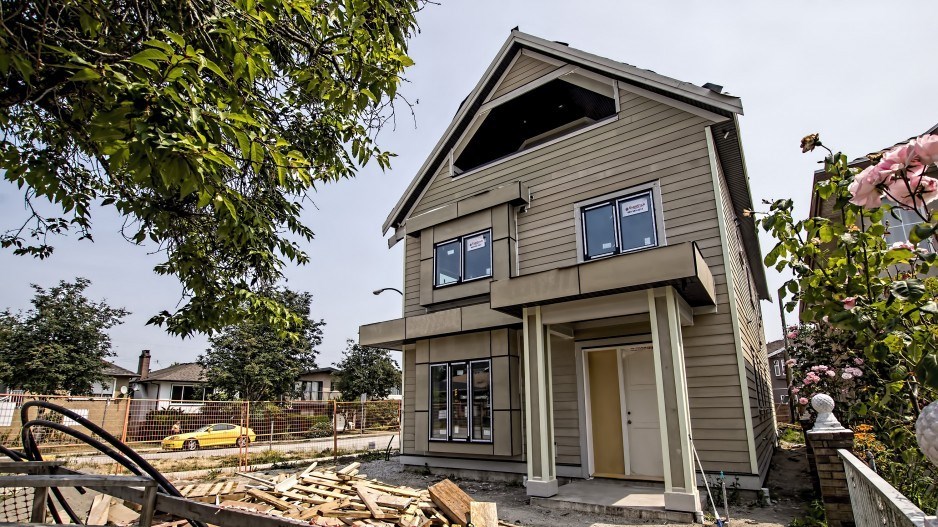Vancouver city council voted Thursday (Sept. 15) to approve a “missing middle” housing motion that city staff say will affect the majority single-family lots.
The motion aims to encourage the construction of multiple dwellings on residential lots and simplify residential zoning. The term “missing middle” refers to housing types that could fall between single-family homes and condominium towers.
Thursday’s public hearing – a necessary step before any changes to a zoning by-law can be approved – resulted in the unanimous approval of the motion as well as two amendments.
The decision will permit up to six homes on lots previously reserved for single-family homes or duplexes. For larger lots, up to eight homes for secured rental housing will be allowed.
This is in addition to consolidating nine different residential zoning types into a single zoning type.
The first motion includes an amendment for city staff to undertake additional work to investigate options for floor space exclusions for elevators, additional space for fully accessible washrooms and other alternatives to improve accessibility.
Council also passed an amendment that directs staff to report back in the second quarter of 2024 with options to update the city’s heritage and character home retention policies.
The goal is to align these policies with the floor space ratio in the missing middle framework and incentivize the protection of these properties.
While many who spoke to council favoured the motion – with some suggestions in mind – criticisms focused on how it will result in only small and incremental change. Multiple members of the public expressed that the motion was needed years ago.
“I won't mince words. This is a really terrible, broken plan,” said Owen Brady, a director at non-profit Abundant Housing Vancouver, who spoke at the hearing in a personal capacity.
Brady referred to predictions from city staff that the motion will add about 150 multiplexes a year, saying that it is not enough.
“The plan barely allows any additional floor space. It allows about 16 per cent more floor space in RS zones, which is roughly the equivalent of adding a studio apartment to a lot,” he said, referring to a zoning designation that encompasses low density, single-family lots.
Brady was not alone in this sentiment, with many others expressing that reducing the allowable size of a single-family home would not improve affordability.
Vancouver has a floor space ratio (FSR) requirement of 0.7 FSR, with a maximum of 0.45 FSR for the portions of the house above the ground. FSR refers to the ratio of the built area to the area of the plot on which the home is built.
This would translate into a 2,800-square-foot home on a typical 33-foot by 122-foot lot. However, the referral report heading to a public hearing proposes to reduce the FSR requirements to 0.6.
This would allow for a 2,400-square-foot home on such a lot, meaning more space can be dedicated to laneway homes. Council also hopes to discourage the replacement of existing single-family homes with new larger houses by reducing the floor area, according to the motion's referral report.
Other speakers highlighted the increased demand it would place on infrastructure and public institutions such as schools or community centres.
To lessen demand on the city’s sewer system, multiplex projects will require rainwater management in the form of detention tanks, said Paula Huber, a senior planner with the city.
Most multiplex applications will also require installing a pad-mounted transformer on the lot to lessen demand on the electrical network.
City staff said in a presentation during the hearing that they’ve conducted six industry sessions, nine public sessions and received 1,900 survey responses to the motion.
Fifty-nine individuals signed up to speak at the hearing. This was in addition to written responses submitted online, with 349 in support, 137 in opposition and 35 who expressed mixed feelings.
Jason Turcotte, president of Darwin Construction Ltd., said he applauds city council’s effort and that this will “move the needle in terms of housing options.”
“But as is often the case, the devil’s in the details. In this case, the details are plentiful. It's so complicated,” he said in an interview. “Frankly, these documents are hard to get through. So I feel like anytime something gets overly complicated, it is counterproductive.”
Turcotte said there’s no silver bullet for the housing crisis and that the motion is a step in the right direction.
Victoria’s Missing Middle Housing Initiative was referenced in the hearing by councillors and speakers who stressed the need to avoid an overcomplicated motion.
Slow uptake of the initiative means Victoria city council now plans to revisit the policy in the fall.
Bryn Davidson, co-owner and design lead at building firm Lanefab Design/Build, said that Vancouver’s motion is “much better” than the one enacted in Victoria and could provide a roadmap to province-wide housing policies.
“[It’s] a profoundly important step forward in terms of moving beyond the exclusionary ‘single-family’ zoning that has defined city planning in Vancouver for a century,” said Davidson in an email.
City staff predict the rezoning will affect about 65,000 single-family lots across Vancouver.
The motion represents an important “consolidation and simplification of the city's complicated zoning rules,” Davidson said.
Huber said inquiry sessions would be hosted for those who are pursuing a multiplex permit.
Staff will also finalize a guide to help individuals with the permitting process.
Vancouver will be in position to accept new multiplex applications by December, Huber said in the hearing.




